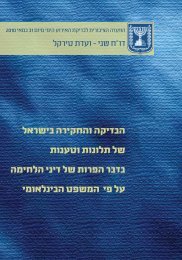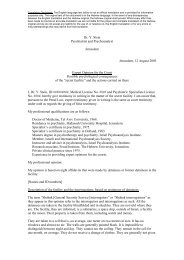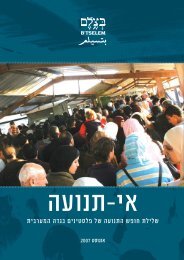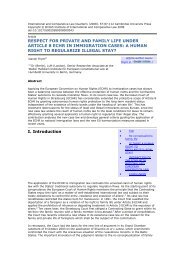HCJ 10650/03 Abu Gwella et. al v
HCJ 10650/03 Abu Gwella et. al v
HCJ 10650/03 Abu Gwella et. al v
Create successful ePaper yourself
Turn your PDF publications into a flip-book with our unique Google optimized e-Paper software.
The correspondence b<strong>et</strong>ween P<strong>et</strong>itioner 6 and the Respondents is attached her<strong>et</strong>o,<br />
marked P/27, A-E.<br />
57. Even after receiving this information, a pre-High Court p<strong>et</strong>ition submitted to the State<br />
Attorney’s Office was necessary to change the status of children who were not<br />
registered with a permanent status. Following the pre-High Court p<strong>et</strong>ition, the<br />
Respondents <strong>al</strong>lowed the registration of children, wh<strong>et</strong>her born inside or outside of<br />
Israel, as permanent, rather than temporary, residents.<br />
The pre-High Court p<strong>et</strong>ition that P<strong>et</strong>itioner 6 submitted to the State Attorney’s Office<br />
is attached her<strong>et</strong>o, marked P/28.<br />
58. Following the above-mentioned action, the Respondents undertook to publish a notice<br />
in their office stating that a child whose mother proves center of life in Israel<br />
(regardless of where the child was born), and y<strong>et</strong> received a temporary status, could<br />
amend the registration. Nevertheless, it was still not possible to assess the effect of<br />
registering many children as temporary, rather than permanent, residents. It is unclear<br />
how many children were registered with a temporary status and did not go to<br />
P<strong>et</strong>itioner 6’s office, or the Respondents’ office shortly, following the directive, and<br />
thus remained with a temporary status, until it “expired” at the end of the twelvemonth<br />
period, when they found themselves, unknowingly, with no status. These<br />
children will likely not become aware of the fact that they are not residents only when<br />
they turn 16 and go to the Respondent’s office to obtain an identity card.<br />
The Respondents’ policy in 2001<br />
59. Before 2001, the office of Respondent 3 processed requests to register residents’<br />
children born outside of Israel in the same manner as requests to register children born<br />
in the country. In mid-2001, P<strong>et</strong>itioner 6 again found that the Ministry of the Interior<br />
was granting a status to children where only one of their parents held temporaryresident<br />
status; this time, the child received a status for two years. The undersigned<br />
immediately wrote to Respondent 3, the director of the East Jerus<strong>al</strong>em office, and to<br />
Ms. Sharon, who had handled the subject the year before. The two of them promised<br />
that they would provide an orderly response on the subject.<br />
The said l<strong>et</strong>ter of the undersigned is attached her<strong>et</strong>o, marked P/29.<br />
60. Following a number of telephone requests to Respondent 3, the undersigned was<br />
fin<strong>al</strong>ly informed verb<strong>al</strong>ly that a new policy had been instituted. Because the new<br />
policy could not be applied to children born in Israel, in that Section 12 of the Entry<br />
into Israel Regulations prohibited it, Respondent 3 ultimately stated, in a telephone<br />
19









